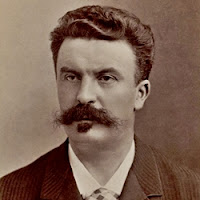The Necklace
Guy de Maupassant
He was a French novelist who was born on August 5, 1850, at the Château de Miromesnil in Normandy. He received religious education in spite of his family being freethinkers aristocrats. For the reason of this education, he entered a seminary when he was thirteen years old, which apparently did not suit him and provoked his own expulsion.
He entered the Ministry of Public Education and also studied law, but he did not feel comfortable with that type of education and studies; Thanks to the advice of a great teacher and friend, his name was Gustave Flaubert, he devoted himself to literature in 1879.
His first work and success was "Tallow Ball", was published a month before the death of his friend Flaubert. Then he continued publishing and writing verses and poems.
According to his biography, he was affected during his lifetime of severe nervous disorders, in 1892, after an attempted suicide in Cannes, he was admitted to the Madhouse in Paris, where he died, after eighteen months of agony, of a general paralysis.
He suffered symptoms of dementia and as a result of syphilis on January 1, 1892, he tried to open his throat three times with a penknife, was interned in a clinic where one year later he died, on July 6, 1893.
Historical background
Maupassant´s historical background is that he published novels of cut mostly naturalist: a Life (1883), Bel-Ami (1885) or strong like Death (1889), among others. Less known is his facet as a chronicler of topicality in the newspapers of the time as Le Gaulois, Gil Blas or Le Figaro, where he wrote numerous chronicles about multiple topics: literature, politics, society, among others.
That's why his first play (Boule de Suif) being the first play was highly acclaimed in addition to other plays and three hundred stories, three travel Books, an anthology of poetry and numerous journalistic chronicles.
Expectations/Predictions about the text
I think this reading selection will be a short story or tale about a specific accessory in this case as the title is called the necklace, that means it should has a special value and worth. My expectation is to know what is the focus of this writing or the message of the author wanted to transmit in this story, I want to know what should be the influence or inspiration of this author to express the thinking in this reading selection.
Basically I expect that will be a kind of enjoy and fun. Also I expect to notice and learn new vocabulary because according with the historical background of the author, he is descriptive so he gives more details in his writin about an specific topic, in this one will be the necklace.
Analysis or Connection between literary work and historical background
Maupassant is connecting the realism and naturalism in this reading selection because he is giving a real example of the situation that everyone could be in our life. He used an extended vocabulary that describes everything that he wants to transmit to the reader. He is being specific with the actions and feelings of the characters.
Also we can realize how the author express this literary work and connect it with his own life, the history said that he studied religion and laws but he did not feel comfortable with this studies so he followed an advice of his friend to start with literature and could express everything that he thought and felt through the writings, novels, books and plays so because of that he got the success to be an known writer.
Literary movement (that the author belongs or represents and what that movement is)
This literary movement was the logical growth of literary realism, it was known by the point of view and beginning of realism. This movement found the expression almost exclusively within the novel. Naturalism sought to go beyond and be more explanatory and descriptive than Realism with respect by identifying the hidden causes of a person's actions or beliefs.
In this case we select this movement for Maupassant because is cosindered one of the most important writers of the Naturalism school. His prose has the virtue of being simple but straightforward, without artifice. His stories, varied, convey with absolute fidelity the Society of his time. But what characterizes him most is impersonal of his narrative.
Not in vain, he is considered one of the greatest storytellers in the history of literature. He never gets involved in history and manifests himself as an omniscient person who merely describes his remarks in detail.
Country: France
Genre / Type: Short story
Did you confirm your predictions? Were they correct? Were they wrong? How? Why?
Yes I did. Some of my expectations were to learn new vocabulary and I did it. The author was really descriptive in the writing, I saw several and new adjectives. So I got new words for my vocabulary.
Also I wanted to know what is the message of the story, I got an example of the lowliness in the life, all people can associate this reading selection with a little part of their life, because all we want to get all the things that we desire, most of the times is really difficult to get them. However is the same problem, we need to live a hard or difficult situation to accept and be grateful with the things that we already have.
Another expectation that was correct is the accessory that is the story about, the necklace was the specific accessory that develop all this reading selection. I that is why I learnt adjectives with the description of this accessory.
References
LOOKING -Biography. (Since 1999). Guy de Maupassant - biography. 1999, de Editors of Buscabiografias.com Sitio web: https://www.buscabiografias.com/biografia/verDetalle/1582/Guy%20de%20Maupassant
The Literature Network. (2000). Naturalism. 2017, de Jalic Inc. Sitio web: http://www.online-literature.com/periods/naturalism.php






